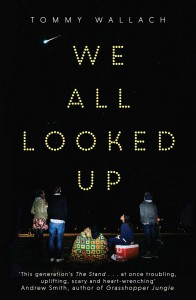WE ALL LOOKED UP
Tommy Wallach
Simon & Schuster, March 2015, RRP $14.95
What happens when you take an over-achiever, a jock, some stoners, and girl with a ‘reputation’, and then throw in an asteroid that will probably end life as we know it? The answer is We All Looked Up, the debut novel from Brooklyn-based writer and musician Tommy Wallach.
In a time when the Young Adult dystopian novel seem to have taken over the world, it is refreshing to read a story that has the human reaction to the threat as the main focus, rather than the threat itself. There is no great autocratic conspiracy, no government-sanctioned virus that has escaped from a secret lab, just a high probability that the asteroid that is heading close to Earth may be on a collision course. This possible impending cataclysm is used a vehicle to explore how we would react if we knew we only had a few months to live, not only on an individual level but as a society as a whole.
As you can imagine, everyone changes the closer the asteroid gets, as they realise that their time in this world may be almost over. Some changes were a little predictable for most of the characters, especially when each was introduced as a high-school stereotype often seen on the big (and little) screens. Peter is the all-American athlete, complete with the beautiful girlfriend and a college scholarship. Eliza is the social outcast, and with the added reputation of being promiscuous (which she’d be the first to admit was true). Anita is the privileged and highly driven student, appearing (from the outside at least) to have the perfect life and future mapped out before her. Finally, there is Andy. Disengaged and flippant, Andy spends most of his time hanging out with his fellow future-dropout Bobo.
Like many of the recent popular dystopian novels, I assumed that this would be suitable for teenage readers and older, and was a little surprised at the violence, drug taking and teenage sex that was scattered occasionally through the story. These scenes were never excessive or graphic, but equally, these scenes were never discussed or broken down from an ethical standpoint, and this seems to require a maturity from the reader beyond the early high school years.
On balance, this is well worth a read. Wallach has developed an interesting idea, and given the initial predictability of some characters, he does take the reader in unexpected directions, and he doesn’t feel any need to resolve everything the way we might like him to.
As an interesting side note, Tommy Wallace has also created an album based on songs featured in (and inspired by) the novel, which can be found on his website.

